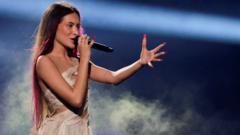43 minutes ago
About sharing
The Eurovision Song Contest has seen a chaotic build-up towards Saturday’s grand final.
The Dutch entry has been disqualified, another has withdrawn from rehearsals and a third has broken rules with an on-stage speech, calling for peace.
The drama is unfolding minute by minute against a backdrop of protests over Israel’s participation in the show.
Thousands of pro-Palestinian marchers have gathered in Malmö, Sweden, where the contest is being held on Saturday.
Some chanted “Eurovision, united by genocide,” reflecting the strength of feeling over the humanitarian toll of Israel’s military campaign in Gaza, which was triggered by the deadly Hamas attacks last October.
Eurovision, which has always billed itself as non-political, has resisted calls for Israel to be excluded from the contest.
However, they did demand that the country’s performer, Eden Golan, change the lyrics of her entry, titled Hurricane, to remove references to the 7 October attack.
Golan, who is just 20 years old, is under armed guard as she prepares to sing at the contest, with heightened security throughout the host city.
Several other competitors have stressed their opposition to the Israel-Gaza war, although none have pulled out – choosing to abide by Eurovision’s slogan, “united by music”.
However, French contestant Slimane broke with protocol during the final dress rehearsal on Saturday afternoon, by interrupting his song to make an impassioned speech.
“Everybody, I just need to say something,” he told the audience. “Every artist here want[s] to sing about love and sing about peace. We need to be united by music, yes, but with love for peace.
“United by music, yes, but with love for peace,” he repeated. “Thank you so much. Thank you Europe.”
The statement itself may have broken Eurovision’s rules on making political statements.
The BBC has contacted the EBU, which organises the contest, to ascertain whether Slimane could be sanctioned.
Earlier, the Irish contestant Bambie Thug withdrew entirely from the dress rehearsal, after raising a complaint about coverage of their performance on Israeli television.
The singer, who is non-binary, said comments made during coverage of their performance at Tuesday’s semi-final breached the competition’s rules.
Israeli TV station KAN referred to a “controversy” over Bambie Thug’s song, whose lyrics reference witchcraft and the occult, then noted that the performer had “spoken negatively about Israel”.
“But we can talk about that later,” their commentator said. “Prepare your curses.”
The comment may have been a reference to a lyric in Bambie Thug’s song, where they put a hex on an ex-boyfriend, but the singer felt it had crossed a line.
“I’m angry with other teams breaching their rules of the EBU, and still being allowed in,” they told RTÉ news in Ireland.
“I hope the EBU will address it correctly.”
In a statement, the EBU said: “We’ve spoken to KAN, the Israeli broadcaster, about this matter and reiterated the importance of all commentators respecting all the artists taking part in the competition and abiding by the rules and regulations of the event.”
Separately, the Dutch contestant, Joost Klein, has been removed from the competition after a backstage incident on Thursday.
An allegation of intimidation was made to Swedish police by a female member of the production crew.
Police said Klein had subsequently been interviewed for making “unlawful threats” and the case would “go to the prosecutor within a few weeks”.
Eurovision organisers said “it would not be appropriate for him to continue in the contest” while the legal process takes place.
In a statement, the Dutch broadcaster Avrotros, said that Klein had been filmed backstage when he had “repeatedly indicated” that he did not want to be.
“This led to a threatening movement from Joost towards the camera. Joost did not touch the camerawoman,” they added, calling the decision to disqualify him “very heavy and disproportionate”.
Videos have circulated on social media of Klein being surreptitiously filmed by the Israeli delegation – but the EBU stressed in their statement that the backstage incident “did not involve any other performer or delegation member”.
Norwegian media is reporting that their jury spokesperson Allesandra Mele has pulled out, citing the “inflamed situation” in Malmö.
The singer came fourth representing Norway last year with the song Queen of Kings.
There have also been unconfirmed reports that several participants skipped the “flag parade” sequence of Saturday’s dress rehearsal.
It all marks a bumpy start to what is usually a carefree and kitsch celebration of European music.
The EBU will be on high alert for political statements being made during the live broadcast, which is watched by more than 160 million people over the world.
But surreptitious messages have already made it to air during the semi-finals.
During Tuesday night’s show, Eric Saade, Sweden’s 2011 Eurovision winner, performed in the half-time slot with a Palestinian keffiyeh wrapped around his wrist.
The musician, who is half-Palestinian, had previously slammed the EBU’s decision to ban Palestinian flags from the arena, alongside the flags of non-competing nations.
The EBU said it “regretted” that Saade “chose to compromise the non-political nature” of the contest.
Meanwhile, some members of the audience booed and turned their back on Israel’s participant after she performed her song on Thursday.
Italy’s contestant Angelina Mango told the BBC that there was “a lot of tension” backstage.
The controversies have made it “difficult to be in the present and enjoy every moment,” she added, “but I don’t want to lose my instinct to do music and to do peace in every way.”
1 hour ago
18 hours ago
1 day ago
1 day ago
